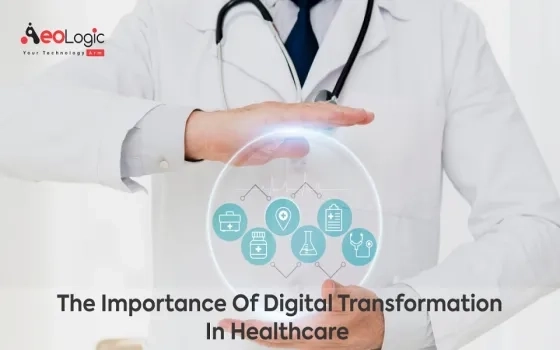Currently, the healthcare area stands at the leading edge of sizeable exchange, pushed by using digital transformation. This revolution is not pretty much adopting new technologies; it's about essentially rethinking how healthcare offerings are brought, making them extra green, accessible, and tailor-made to patient needs. As professionals in the area, we understand the giant capability that digital transformation holds for improving healthcare outcomes and improving affected person experiences.
Let's dive deeper into this transformative adventure, exploring why healthcare vendors need to conform and innovate in the face of technological advancements. By embracing digital transformation in healthcare, we can liberate an international of possibilities that gain sufferers, healthcare professionals, and the industry as a whole.
How to Understand the Digital Transformation in Healthcare?
When digital tools are used in every sector of healthcare, from looking after patients to jogging the lower backstop, that is referred to as "digital transformation."
So, to make healthcare better, we will use equipment like telemedicine, digital fitness data (EHRs), artificial intelligence (AI), and system-gaining knowledge. This equipment no longer most effectively makes matters run more smoothly but additionally delivers docs accurate records about the affected person's health, which permits them to provide personalized and preventative care.
EHRs, for example, make it clean for extraordinary healthcare workers to proportion affected person facts. In this manner, anybody worried about an affected person's care can see the maximum up-to-date information.
Another instance is telemedicine, which has changed the way we consider healthcare transport using letting human beings speak to their doctors from domestic.
When healthcare carriers use these technologies collectively, they can supply their sufferers greater convenient, quick, and personalised care.
Now we can say, that going digital in healthcare isn't always just a trend; it's an important exchange to keep up with the demanding situations and wishes of ultra-modern healthcare machines.
Why Digital Transformation is Important in Healthcare?
Digital transformation in healthcare is essential for a variety of reasons, all of which contribute to a more effective and efficient healthcare system.
1. Improving patient care and outcomes
First and foremost, digital transformation improves patient care and results. Healthcare professionals can use technology like AI and machine learning to anticipate and prevent health concerns before they become critical, allowing for a more proactive approach to healthcare.
Wearable technology can monitor vital signs in real-time, providing healthcare practitioners with rapid data and enabling quick intervention when needed. This degree of tailored and preventative care is only possible with the digital tools we have today.
2. Improving Data Management and Security
Another key part of digital transformation is the enhancement of statistics control and protection. Healthcare professionals may additionally shop, get the right of entry to, and analyze large volumes of information more correctly via the usage of digital records.
This now not only simplifies administrative techniques, but also dramatically improves the safety of crucial affected person data. Advanced encryption strategies and secure statistics garage systems prevent unlawful admission, preserving affected persons' confidentiality and confidence.
3. Streamline Operations and Cut Costs
Digital transformation is also vital for enhancing operational performance and lowering healthcare fees. The automation of administrative chores relieves the strain on healthcare people, allowing them to listen more to affected person care.
Furthermore, digital solutions can be useful resources with progressed resource management, from scheduling appointments to dealing with inventories, resulting in cost savings that can be surpassed directly by sufferers.
4. Making Telehealth and Remote Care easier
The ability to provide care from afar through telehealth services is one of the main reasons why healthcare needs to go digital. The worldwide health disasters have shown how important it is to be able to provide medical care from afar.
Patients can get advice, follow-up care, and even some types of treatment through digital tools and platforms, all without having to leave their homes. This not only makes healthcare easier to get, especially for people who live in remote or underserved areas, but it also makes healthcare centers less busy.
Telehealth services make things easier for patients and are an important way to keep the public healthy.
5. Enhancing Patient Engagement and Satisfaction
The digital change also makes patients much more engaged and happy. Patients can easily get to their health data, make appointments, and talk to their healthcare providers through digital portals.
Patients are more likely to be involved in their care when information is clear and easy to get. Digital tools can also give people personalized health advice and reminders, which makes them more involved in managing their health.
Better health outcomes and higher patient satisfaction are directly linked to more involvement. This shows how digital solutions can change healthcare.
Challenges of Implementing Digital Transformation
The importance of digital transformation in the healthcare industry is incomparable for several reasons, each of which contributes to a healthcare system that is more effective and efficient.
1. Addressing Privacy and Security Concerns
In healthcare, privacy, and safety are very important. Break-ins are more likely to happen as we store more info online. To keep patient information safe, healthcare providers need to spend a lot of money on advanced cybersecurity methods. This takes a lot of work and constant attention.
2. Overcoming Resistance to Change Among Staff
People often don't want to change, and this is also true in healthcare. For staff who are used to using old-fashioned methods, switching to digital systems can be scary. To make this transition easier, people need to keep learning about the benefits of getting digital and be told about them clearly.
3. The Need for Continuous Training and Development
Digital technologies change quickly, so healthcare workers need to keep learning new skills. Keeping up with the latest developments is important for getting the most out of digital transformation, but it can be hard for any healthcare company.
4. Navigating Regulatory Compliance and Interoperability Issues
One big problem is figuring out how to follow all the rules and regulations. Healthcare is one of the most regulated businesses in the world. For example, HIPAA in the US has strict rules about the privacy of patient data.
As laws change, digital transformation projects must be made to fully follow these rules, which can be a moving goal. Interoperability, which means that different software and systems can talk to each other and share data, is also still a big problem.
For a more complete approach to patient care, new digital tools must work well with current systems and those of other healthcare providers. However, this can be hard to achieve in real life.
5. Managing the Digital Divide and Ensuring Equity in Healthcare Access
We also can't forget about the digital gap as a problem. Not all patients have the same level of access to the digital tools that make modern healthcare possible, like fast internet for telemedicine appointments or smartphones with health tracking apps.
This difference can make it harder for some people to get the health care they need and lead to different outcomes. This is especially true for rural and underserved areas. Healthcare providers and lawmakers need to face this problem head-on and make sure that the shift to digital technology helps everyone equally and doesn't make health disparities worse.
Final Thoughts
There is no viable way to overestimate the significance of digital transformation inside the healthcare industry. This represents a big step closer to reaching healthcare that is extra green, powerful, and individualized. Even though there are barriers, the ability rewards notably outweigh the inconveniences. Accepting innovation will be vital to enhancing affected person care and figuring out the route that the healthcare enterprise will take within the destiny as we continue to navigate this digital revolution.
In the sector of healthcare, embracing digital transformation solutions isn't always merely a preference; as a substitute, it is an absolute requirement. We have the hazard to reconsider the delivery of healthcare by way of making it extra effortlessly available, extra individualized, and greener for all parties engaged who are worried. Let's make the maximum of this brilliant risk and paintings together to create a more healthful future.




















